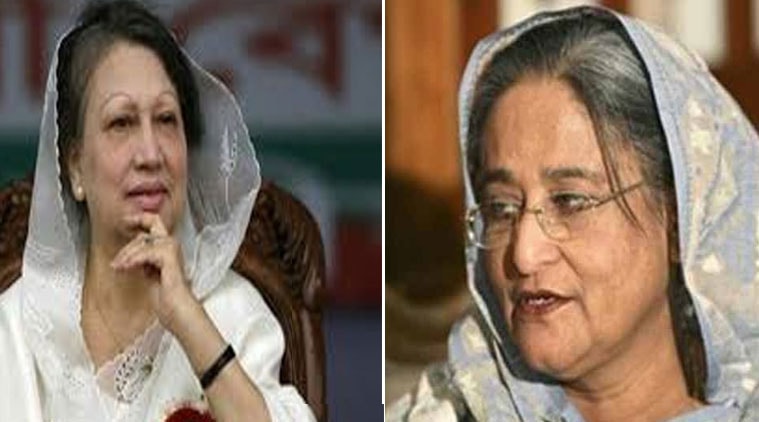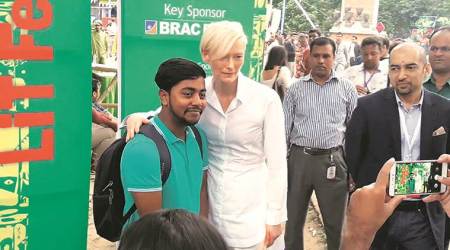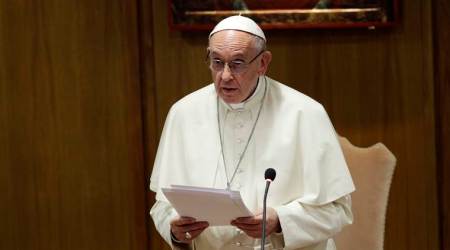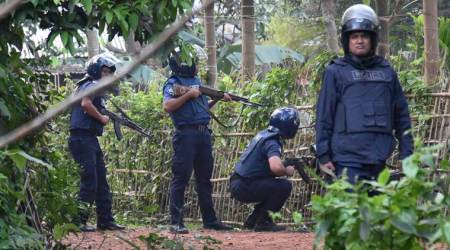Storm cloud over Dhaka
With a year to go for polls, Bangladesh is increasingly becoming securitised and its government authoritarian.
 BNP leader Khaleda Zia led a massive rally at the Suhrawardy Park in central Dhaka, shutting down the capital for several hours. Hasina responded with a huge show of strength on the 18th, ostensibly to celebrate UNESCO’s recognition of her father’s magnificent March 7, 1971 speech. (Representational Image)
BNP leader Khaleda Zia led a massive rally at the Suhrawardy Park in central Dhaka, shutting down the capital for several hours. Hasina responded with a huge show of strength on the 18th, ostensibly to celebrate UNESCO’s recognition of her father’s magnificent March 7, 1971 speech. (Representational Image)
-

-


November may well turn out to be, in retrospect, the month that decides Bangladesh prime minister Sheikh Hasina’s political fate. On the 7th, Mubashar Hasan, assistant professor at Dhaka’s North South University, was picked up, allegedly by the country’s very powerful military intelligence agency. On the 11th, Chief Justice S.K. Sinha submitted his resignation after being publicly hounded by the prime minister and her cohorts for daring to declare null and void the 16th amendment to the Constitution — he was accused of graft, and has since left the country — which when passed in 2014 allowed parliament to remove top judges. Of course, since Hasina’s Awami League overwhelmingly won the last election — the opposition BNP and its ally Jamiat-i-Islami stayed out in protest — this meant that Bangabandhu’s daughter was now trying to control the judiciary as well.
Then on the 12th, BNP leader Khaleda Zia led a massive rally at the Suhrawardy Park in central Dhaka, shutting down the capital for several hours. Hasina responded with a huge show of strength on the 18th, ostensibly to celebrate UNESCO’s recognition of her father’s magnificent March 7, 1971 speech. In reality, she was responding to Zia’s November 12 challenge, daring her to participate in elections that will be held a year from now.
So what’s going on in Bangladesh? Hasina’s energetic response to the Rohingya crisis has certainly brought her international kudos — compared to the mealy-mouthed response of the Indian leadership, the leader of this still-poor nation has had the courage to call out Myanmar’s ethnic cleansing drive, thereby forcing China to react — even as she has presided over the best boom years in recent history. The ADB recently stated that Bangladesh’s economy grew by 7.1 per cent in 2016, the fastest in 30 years, while GDP growth was more than 6 per cent for the sixth year running.
But this rosy picture is in sharp contrast to the prevalent sense of gloom and doom one finds in several middle-class homes in Dhaka. Talk of Hasina’s rising authoritarianism has been rife over the last few years as the government slapped 82 cases of sedition against the respected Daily Star newspaper, forcing its editor to rush around the country presenting himself before mofussil courts. Bengali daily Prothom Alo is another favourite whipping boy of the government. A tenuous peace is currently in place, but according to several journalists, the long arm of the director-general of forces intelligence is never far away.
The state is becoming increasingly securitised. Under the excuse of protecting the population, especially since the Holey Bakery attack last summer, new batallions are being raised. The armed forces are becoming more and more powerful, making Hasina buy two submarines from China — it’s not clear where or why or for what they will be used. People are being kidnapped by security forces at random — the human rights organisation Odhikar says 74 people have been secretly detained only in 2017. Awami League insiders say the party is split down the middle, that corrupt activities, rent-seeking, nepotism and bribery have gone “out of control” in Dhaka and other big cities.
People are so fed up of the Awami League, it is said, that if elections were to be held today, Hasina’s party would win a mere 75 seats out of 300 in parliament (an extra 50 seats are reserved for women). Hasina, herself, is still seen to be completely clean, but like elsewhere in South Asia, wants the political baton to be passed on to her son, Joy. Joy, however, has little grassroots support, so her sister Sheikh Rehana and her son, fondly known as Bobby, are said to be wielding a lot of the real power.
But Bangladeshis also realise that if Hasina loses and the BNP comes to power, there will be a bloodbath on the streets. Khaleda’s son Tarique, in London for several years on corruption charges and anti-India to boot, is sure to exacerbate the widening political chasm in the country and blame India for its ills. Pushing arms into the hands of Northeastern insurgents, sucking up to the China-Pakistan axis and turning Bangladesh into a de facto authoritarian state backed by the military will become the BNP’s calling card.
Certainly, Delhi isn’t too comfortably with Hasina cosying up to the Chinese (last year when Xi Jinping visited, he cut Bangladesh a cheque of $26 billion), sending an envoy to Pakistan on the Rohingya issue, hoping to join China’s ambitious OBOR project and criticising the country’s first Hindu chief justice. On the other hand, she has been hugely responsive to Indian requests to curb insurgency in the Northeast, reopen train and bus services with neighbouring Indian states like Tripura and West Bengal and even allow Indian goods to transit on inland waterways. Most importantly, with Pakistan fast falling to Army rule with a civilian face, India will do what it can to prevent Bangladesh going the same way. All said and done, Sheikh Hasina remains India’s long-term best bet as well as that of her own disgruntled population.
So here’s a new twist in the tail. The BNP has been reaching out to the Indian government, with Khaleda meeting Sushma Swaraj when she visited in October, even though the BNP leader had snubbed former president Pranab Mukherjeeduring his visit to Dhaka in 2013. (Khaleda should pass on her reins to the mild-mannered BNP secretary-general Fakhrul Islam, if she means serious business.) Meanwhile, Delhi hopes that Hasina will pave the way for a “visibly minimum participatory election,” meaning that the BNP, as the legitimate opposition party, should participate in polls when they are held a year from now.
For a nation which cut its teeth on the anvil of democracy, the coming year will tell us if those promises Bangladesh made to itself in 1971, are being kept. The rest of the region will be watching closely.
